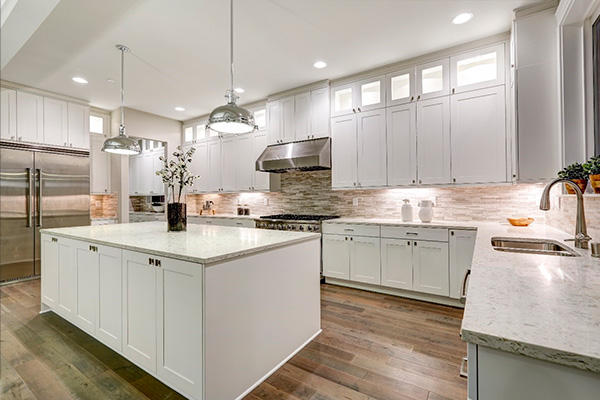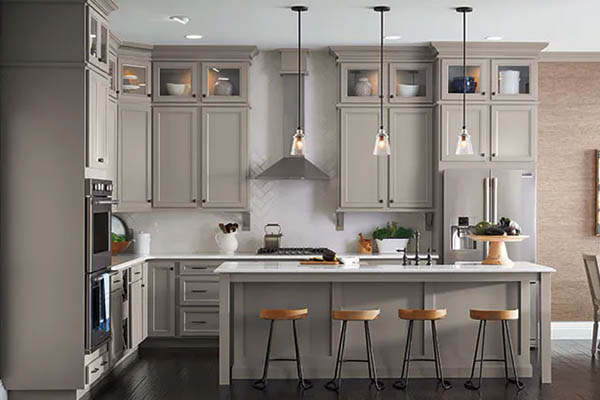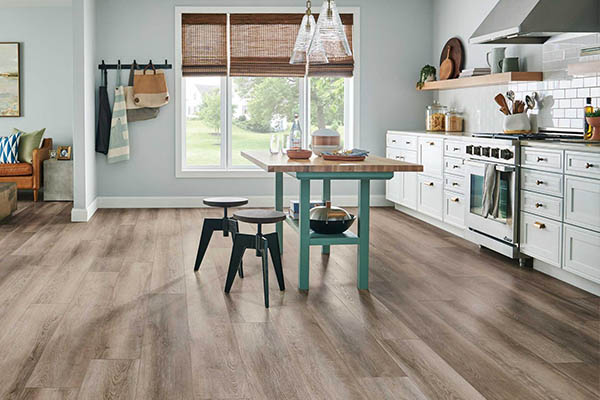Outdoor Kitchen Countertops: Choosing the Best Material for Your Space

The tradition of cooking outdoors is not new. Thousands of years ago in ancient Greece, cooking was primarily done outdoors. The Greeks were known in the ancient world of that time for their love of grilled meats marinated in olive oil and herbs before being cooked over an open flame.
Archeological findings in Italy revealed that outdoor kitchens called “culinae” were common during the Roman empire. Sharing meals and having outdoor feasts was one of the ways to bond with family, friends, and business or political partners.
In the United States, outdoor cooking and dining became popular in the 1950s and 1960s as people started to spend more time outdoors and entertain guests in their backyards.
Nowadays, imagining an American home without a backyard and at least one cooking appliance like a BBQ grill is hard.
People that enjoy outdoor dining, open-air family gatherings, and parties under a sky full of stars tend to build fully functional outdoor kitchens.
One of the crucial elements of an outdoor kitchen is the countertop. Choosing the right one will impact not only the visual component of the outdoor kitchen but the overall practical experience.
What are the best materials for outdoor kitchen countertops?
Well, there is no such thing as the best material. Each type has its pros and cons, and finding the best combination of practical and aesthetical qualities to match your specific requirements is essential. Let’s check the most popular options.
Most popular options for outdoor kitchen countertops:
Granite countertop: Granite is a highly durable and resilient material that can withstand the wear and tear of daily use in outdoor environments. It is heat-resistant and can withstand exposure to high temperatures without cracking or melting, making it ideal for outdoor kitchens or grilling areas.
Additionally, granite is highly resistant to scratches and stains, making it a practical choice for outdoor spaces where spills and messes are more likely to occur.
Due to its durability and low maintenance needs, granite has become a popular choice for outdoor countertops and is av. It is in various colors and patterns to complement any design style.
Quartz countertops: Quartz is a popular material for outdoor countertops due to its durability and resistance to heat, scratches, and stains. With a lifespan of up to 25 years or more with proper maintenance, quartz countertops are a long-lasting investment for any outdoor space. Additionally, quartz comes in a wide range of colors and patterns, providing homeowners with the opportunity to customize the appearance to fit their preferred design style. While it may be pricier than some other materials, its durability and low maintenance needs can make it a cost-effective choice in the long run.
Concrete countertops: Countertops made of Concrete can be tailored to fit any design style and are highly resilient. While relatively affordable and requiring low maintenance, they are susceptible to cracking when exposed to extreme temperature changes.
Soapstone countertops: With its natural heat and stain resistance properties, Soapstone is a distinctive and elegant natural stone with a smooth, matte finish.
Nonetheless, compared to other materials, it can be relatively more expensive.
Stainless Steel countertops: Due to its resistance to rust, heat, and staining, Stainless Steel countertop is a favored choice for outdoor kitchens. Moreover, it is easy to clean, which makes it a convenient selection for cooking and preparing food.
Tile countertop: Tile is a versatile and affordable option for outdoor countertops. The variety of colors and patterns offered makes it possible to customize the appearance to suit any design style.
Ultimately, the best type of countertop for your outdoor space will depend on your preferences, budget, and the specific environmental conditions in your area. It is essential to consider factors like durability, resistance to weather, and maintenance needs when making a choice.

What is the cheapest option for outdoor kitchen countertops?
When it comes to outdoor countertops, the cheapest option is usually tile.
Tile is preferred for outdoor countertops because it offers an affordable and versatile design option.
It is also easy to install and comes in various colors and patterns, allowing you to customize your design to your liking. Additionally, tile is resistant to heat, water, and stains, making it a practical choice for outdoor use.
Other affordable options for outdoor countertops include concrete and laminate.
Concrete is a durable and customizable option that can be stained or stamped to achieve a variety of textures and patterns. However, it can be prone to cracking if exposed to extreme temperature fluctuations.
Laminate is another affordable option that is easy to install and comes in a variety of colors and finishes. However, Laminate is not water resistant. It is essential to keep the water and moisture from getting under the top layer through scratches, cracks, or joints.
What outdoor kitchen countertops withstand extreme temperatures and weather conditions?
Granite: Granite has gained popularity for outdoor countertops due to its ability to resist heat, scratches, and stains, making it highly durable. It is also resistant to freezing temperatures and is not affected by direct sunlight or rain exposure.
Soapstone: Soapstone, a natural stone, is recognized for its ability to endure heat and its durability. It can withstand wide temperature fluctuations and is also resistant to scratches and stains, albeit it may come at a higher cost than other materials.
Quartzite: With a similar appearance to marble but with greater durability, quartzite is a natural stone that is functional for outdoor countertops, as it can withstand heat, scratches, and stains. Nevertheless, it may come at a higher cost than other materials.
Concrete: Concrete is a durable and versatile option for outdoor countertops that can be customized to fit any design aesthetic. It is resistant to heat and weather conditions but can be prone to cracking if exposed to extreme temperature fluctuations.
Stainless steel: Stainless steel has become a favored choice for outdoor kitchens due to its ability to resist rust and corrosion caused by outdoor weather conditions, such as humidity and rain. It is also highly heat-resistant, making it ideal for outdoor cooking. Additionally, stainless steel is easy to clean and maintain, essential for outdoor spaces where dirt and grime can accumulate quickly.
It is crucial to remember that even the most robust materials are prone to damage if not appropriately maintained. To ensure the longevity of your outdoor countertops, regularly clean and seal them to protect against exposure to weather conditions and extreme temperatures.

What are the pros and cons of each particular material?
Here are some pros and cons of popular outdoor kitchen countertop materials:
Tile:
Pros: Affordable, easy to clean, and comes in various colors and patterns.
Cons: Not as durable as other materials, can crack or chip over time.
Concrete:
Pros: Customizable, durable, and requires little maintenance.
Cons: Can crack if exposed to extreme temperature fluctuations, can stain or scratch easily.
Granite:
Pros: Durable, heat-resistant, scratch-resistant, comes in various colors and textures.
Cons: It can be more expensive than other materials and requires regular sealing.
Soapstone:
Pros: Heat-resistant, stain-resistant, unique, and elegant appearance.
Cons: More expensive than other materials, can scratch easily, requires regular maintenance.
Stainless Steel:
Pros: Resistant to rust, heat, and stains, easy to clean, and practical for cooking and food preparation.
Cons: Can scratch easily, be noisy, and require additional support.
Quartz:
Pros: Durable, scratch-resistant, stain-resistant, comes in various colors and patterns.
Cons: More expensive than some other materials, can be prone to chipping or cracking.
Marble:
Pros: Elegant appearance, heat-resistant.
Cons: Not as durable as other materials, can be prone to scratches and stains, requires regular sealing.
When choosing the best material for your outdoor countertop, it's essential to consider your specific needs, design preferences, and budget. Be sure to weigh the pros and cons of each material to make an informed decision that will best suit your outdoor space.

How do you properly maintain outdoor kitchen countertops?
Ensuring the longevity of your outdoor countertops heavily relies on carrying out proper maintenance procedures.
Here are some tips for maintaining your outdoor kitchen countertops:
Clean regularly: It's essential to clean your outdoor countertops regularly to prevent the buildup of dirt, grime, and other debris.
Employ a mild soap and water solution or a specialized countertop cleaner for cleaning, and abstain from using acidic or abrasive cleaners that may harm the surface.
Seal the surface: Many outdoor countertop materials, such as granite and concrete, require regular sealing to protect against exposure to weather conditions and stains.
Observe the manufacturer's instructions for sealing and resealing the surface when necessary.
Protect against heat: Use trivets or heat-resistant mats to shield the countertop surface and avoid placing hot pots and pans directly on it to protect against heat damage.
Protect against scratches: To prevent scratches, use cutting boards when preparing food, and avoid using abrasive materials to clean the surface.
Address stains immediately: If you notice a stain on your outdoor countertop, instantly prevent it from setting. Use a specialized stain remover or a poultice made from baking soda and water to absorb the paint.
Protect: When not in use, cover your outdoor countertops with a weather-resistant cover or tarp to protect against exposure to sunlight, rain, and snow.
By following these maintenance tips, you can help ensure the longevity of your outdoor countertops and protect your investment for years to come.

What is the expected lifespan of each material?
The expected lifespan of outdoor countertop materials can vary depending on several factors, such as the material used, the level of maintenance, and the amount of exposure to outdoor weather conditions.
Here is a general overview of the expected lifespan of popular outdoor kitchen countertop materials:
Tile: The expected lifespan of tile countertops is approximately 10 to 15 years with proper care and maintenance.
Concrete countertops can last up to 25 years or more with regular cleaning and sealing.
Granite: Granite countertops are known for their durability and can last 30 years or more with proper maintenance.
Soapstone: Soapstone countertops can last for decades with regular maintenance, as they are highly resistant to heat and stains.
Stainless Steel: Stainless steel countertops can last many years with proper cleaning and maintenance and are highly resistant to rust and stains.
Quartz: Quartz countertops are a highly durable and long-lasting material that can withstand the wear and tear of daily use. With proper maintenance, quartz countertops can last up to 25 years or more, making them an excellent investment for outdoor space.
Marble: Marble countertops are less durable than other materials and may require regular sealing to prevent stains and damage. With proper maintenance, marble countertops can last up to 20 years.
Can I use pavers as an outdoor kitchen countertop?
While it is technically possible to use pavers as a countertop material, it is not a standard or recommended choice.
Pavers are typically used for outdoor flooring or paving and may not be suitable for use as a countertop surface.
Pavers are not explicitly designed for use as a countertop and may not be heat-resistant or durable enough to withstand the wear and tear of daily use.
Additionally, pavers are not intended to be easily cleaned or sealed, making them prone to staining or damage.

What is the cost range for outdoor kitchen countertops?
The cost of outdoor countertops can fluctuate greatly depending on several factors, such as the material employed, the size and shape of the countertop, and the intricacy of the installation.
Here are some general cost ranges for popular outdoor kitchen countertop materials:
Tile is typically the most affordable option for outdoor countertops and can range from $5 to $30 per square foot.
Concrete: Concrete countertops can range from $60 to $130 per square foot, depending on the complexity of the design and any customizations.
Granite: Granite is a durable and popular choice for outdoor kitchen countertops but can be more expensive, ranging from $60 to $200 per square foot.
Soapstone: Soapstone is a natural stone resistant to heat and stains but can be more expensive than other materials, ranging from $70 to $120 per square foot.
Stainless Steel: Stainless steel kitchen countertops are popular for outdoor kitchens, ranging from $80 to $225 per square foot.
Quartz: The cost of quartz countertops can vary, typically ranging from $70 to $120 per square foot, depending on the brand, quality, and color.
Bear in mind that these cost ranges are rough approximations, and your unique requirements, design inclinations, and the intricacy of the installation will determine the actual cost of your outdoor countertops.
Be sure to get a detailed quote from a reputable contractor or installer to get a more accurate idea of the cost of your outdoor countertops.

What are the installation requirements for outdoor kitchen countertops?
Some special installation considerations for outdoor countertops should be considered to ensure proper support and stability.
Here are a few things to keep in mind:
Foundation: Depending on the size and weight of the countertop, it may require a unique foundation or support system. For example, a large granite countertop may require a reinforced concrete foundation or steel support brackets to provide sufficient structural support.
Leveling: It's essential to ensure the outdoor countertop is level to prevent water pooling and causing damage. Additional leveling may be required if the countertop is installed on an uneven surface.
Weatherproofing: Outdoor kitchen countertops should be properly sealed and weatherproofed to prevent damage from exposure to the elements. This may include using weather-resistant materials or applying a specialized sealant to protect against moisture and UV rays.
Plumbing and electrical considerations: If the outdoor countertop contains features such as a sink or electrical outlets, additional considerations may be required to ensure proper installation and safety.
Installers: Working with a professional installer or contractor with experience in outdoor countertop installation is essential to ensure proper installation and avoid potential problems.
By considering these special installation considerations, you can help ensure the stability and longevity of your outdoor countertops. Consult a professional installer or contractor to determine the specific installation requirements for your chosen material and design.

Can you integrate built-in sinks or grills?
Outdoor kitchen countertop can be customized to fit a specific outdoor space or design aesthetic. Many materials, such as granite, quartz, and concrete, can be cut and shaped to fit a particular area or design.
Additionally, outdoor kitchen countertop can be customized with features such as built-in sinks, grills, or bar areas to meet specific needs or design preferences.
By working with a professional installer or contractor, you can create a customized outdoor countertop that fits your unique design and functionality requirements.
What are the latest trends in outdoor kitchen countertops?
Several trends in outdoor countertops have gained popularity in recent years.
Here are a few latest trends:
Dark countertops: Dark outdoor kitchen countertops, such as black or charcoal, have become increasingly popular in outdoor spaces. They offer a sleek and modern aesthetic and can be used to create a high-contrast look with light-colored flooring or cabinetry.
Textured finishes: Textured finishes, such as matte or honed surfaces, have become more popular in outdoor countertops. These finishes can add depth and visual interest to the surface, making it more slip-resistant.
Sustainable materials: Sustainable materials like recycled glass or bamboo have become increasingly popular for outdoor countertops.
These materials present a sustainable option for homeowners who desire to minimize their ecological footprint.
Integrated appliances: Outdoor kitchens and living spaces are becoming more sophisticated, with features such as built-in grills, refrigerators, and sinks. Countertops with integrated appliances can help to create a seamless and functional outdoor space.
By incorporating these latest trends into your outdoor countertop design, you can create a functional and stylish space that reflects your individual style and needs.



